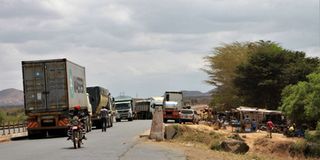Premium
Virus-stung truckers find paradise in Daraja Mbili

A section of Daraja Mbili, a roadside market on the border of Kajiado and Makueni counties along Mombasa-Nairobi highway.
What you need to know:
- The few eateries which operated clandestinely openly refused to serve truck drivers.
- This was because it was widely believed they were super spreaders of the respiratory disease.
- Most customers come with their dishes, which they fill with their favourite meals, and head back to the trucks.
Agnes Mulee’s face lit up when a truck pulled over next to her stall at River Maangi Uvungu bridge near Kiboko Township along Mombasa-Nairobi highway on a warm morning in March.
“Is he a customer?” she wondered.
The weary driver implored on her to make him a meal and she agreed.
The encounter left Ms Mulee Sh500 richer, earned her a friend and inspired the sprouting of the latest and most vibrant markets in the region – Daraja Mbili.
"The driver revealed he had travelled for hours from Uganda and had not had a meal,” she told Nation in an interview.
The driver’s situation, Ms Mulee would later learn, had been partly caused by the restrictions the government had put in place then to tame the spread of Covid-19 and associated stigma levelled against long distance truck drivers.
Although the government allowed truckers to operate during curfew time, long distance drivers struggled to get a proper meal. Most restaurants operating along Nairobi-Mombasa highway around that time had been shut following a raft of far-reaching restrictions the government had put in place to slow down the spread of Covid-19. Only a handful of eateries along the highway met the strict conditions for resumption of business.
Refused to serve truckers
The few eateries which operated clandestinely openly refused to serve truck drivers because it was widely believed they were super spreaders of the respiratory disease, according to multiple accounts of the traders, the truck drivers, and Kenya Transporters Association (KTA).
“The denial of service at restaurants pushed some truck drivers to learn the hard way to cook simple meals after buying gas cylinders, utensils and food stuffs. Others moved in convoys and they would stop somewhere and jointly make their meals,” said Ms Mercy Ireri, the chief operations officer at KTA, a lobby which advocates for a smooth business environment for truckers. The rest wallowed in hunger and banked on snacks and Good Samaritans like Ms Mulee for their meals.
But now, Daraja Mbili, the once dull market is a vibrant stopover for more than 400 truck drivers daily, creating a spectacle which turns the heads of motorists on the busy highway. It is the biggest market for fresh vegetables, including indigenous, which are grown in nearby irrigated farms.
Open kitchenettes
Most customers come with their dishes, which they fill with their favourite meals, and head back to the trucks. The rest sit under acacia trees and watch as cooks prepare their meals in open kitchenettes using smokeless energy saving stoves.
"I am drawn to Daraja Mbili stalls by the Kienyeji chicken which is highly affordable and the fresh okra," said Mr Thomas Paul, noting regular customers are attracted by morori, a herbal Maasai soup touted as medicinal.
Currently, the stigma against truck drivers has eased and many restaurants along the highway have opened their doors to a few customers as directed by the government. However, long distance truck drivers are yet to recover from the harrowing experiences during the earlier days of the Covid-19 pandemic.
Stigmatisation was set off by a diplomatic tiff between Kenya and her neighbours in East Africa over unharmonised cross border Covid-19 protocols.
It was later fanned by Ministry of Health mapping out the highway as a major corridor of the disease.
Trucks stopping banned
Severally, Health CS Mutahi Kagwe expressed concern that truck drivers were spreading the disease. Moves by some county governments along the highway to bar trucks from stopping in their regions worsened the situation.
In addition to Covid-19 stigmatisation, thieves took advantage of the curfew hours to steal fuel and valuables from parked lorries.
A month ago, for instance, a notorious gang of locals, which was caught siphoning fuel from a lorry parked at Ikoyo market in Makueni County lost a member, who was beaten by residents who included truck drivers.
The market is not served with public services such as water because it is not planned by neither Kajiado nor Makueni counties.




